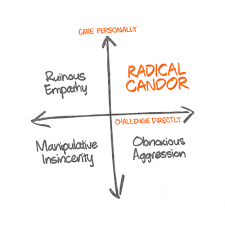
Building your Conflict Transformation Toolbox: Radical Candor
A recent article in The Globe and Mail pegged the cost of workplace conflict (or unresolved conflict) at a whopping $16.1 billion in 2012 (Conference Board of Canada). Managing conflict productively is not only a key leadership competency, if done well, it’s a competitive edge that enables innovation, superior decision-making, and higher performing teams. So many of us would rather supress conflict at work rather than to address it because of the fear of negative consequences.
I had the chance to read Radical Candor recently, which, high level, invites us to challenge directly and care personally in our workspaces. This book offers insight into how to create workplace cultures that can better handle conflict as it arises, and even prevent or de-escalate conflict. Scott offers insightful narratives based on experiences at highly-performing companies like Google and AdSense, as well as concrete examples on how to best action the learning, with Part II completely dedicated to Tools and Techniques.
Scott’s framework identifies three additional quadrants in which workplace feedback can fall:
Obnoxious Aggression™ is what happens when you challenge but don’t care. It’s praise that doesn’t feel sincere or criticism that isn’t delivered kindly.
Ruinous Empathy™ is what happens when you care but don’t challenge. It’s praise that isn’t specific enough to help the person understand what was good or criticism that is sugar-coated and unclear.
Manipulative Insincerity™ is what happens when you neither care nor challenge. It’s praise that is non-specific and insincere or criticism that is neither clear nor kind.
“Radical Candor builds trust and opens the door for the kind of communication that helps you achieve the results you’re aiming for. It turns out that when people trust you and believe you care about them, they are much more likely to:
I wanted to share three great insights, rooted in what I see as the lens of conflict transformation, that if integrated into our leadership practice, can position us for more positive conflict experiences.
Kim Scott also launched a podcast and a blog you can follow to learn more about “Radical Candor”.
By: Leena Sharma Seth
A recent article in The Globe and Mail pegged the cost of workplace conflict (or unresolved conflict) at a whopping $16.1 billion in 2012 (Conference Board of Canada). Managing conflict productively is not only a key leadership competency, if done well, it’s a competitive edge that enables innovation, superior decision-making, and higher performing teams. So many of us would rather supress conflict at work rather than to address it because of the fear of negative consequences.
I had the chance to read Radical Candor recently, which, high level, invites us to challenge directly and care personally in our workspaces. This book offers insight into how to create workplace cultures that can better handle conflict as it arises, and even prevent or de-escalate conflict. Scott offers insightful narratives based on experiences at highly-performing companies like Google and AdSense, as well as concrete examples on how to best action the learning, with Part II completely dedicated to Tools and Techniques.
Scott’s framework identifies three additional quadrants in which workplace feedback can fall:
Obnoxious Aggression™ is what happens when you challenge but don’t care. It’s praise that doesn’t feel sincere or criticism that isn’t delivered kindly.
Ruinous Empathy™ is what happens when you care but don’t challenge. It’s praise that isn’t specific enough to help the person understand what was good or criticism that is sugar-coated and unclear.
Manipulative Insincerity™ is what happens when you neither care nor challenge. It’s praise that is non-specific and insincere or criticism that is neither clear nor kind.
“Radical Candor builds trust and opens the door for the kind of communication that helps you achieve the results you’re aiming for. It turns out that when people trust you and believe you care about them, they are much more likely to:
- Accept and act on your praise & criticism;
- Tell you what they really think about what you are doing well and, more importantly, not doing so well;
- Engage in this same behaviour with one another; meaning less pushing the rock uphill again and again;
- Embrace their role on the team;
- Focus on getting results.
I wanted to share three great insights, rooted in what I see as the lens of conflict transformation, that if integrated into our leadership practice, can position us for more positive conflict experiences.
- Relationships, not power, drive progress.
- Authenticity please.
- Empathy has a shadow side.
Kim Scott also launched a podcast and a blog you can follow to learn more about “Radical Candor”.
By: Leena Sharma Seth

